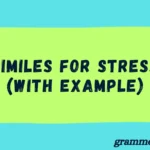The English language loves to confuse us—and the past tense of “tear” is a perfect example. Whether you’re writing an essay, editing dialogue, or just texting, it’s easy to stumble between tore, torn, and teared. What’s the right form? Well, it depends on what you mean. Are you ripping something apart or shedding tears? While “tore” and “torn” relate to physical damage, “teared” is typically tied to crying.
This makes tear a polysemous verb, with forms that change based on usage. In this guide, we’ll break down the grammar, share pronunciation tips, and give clear examples so you never mix them up again. Whether you’re learning English or brushing up, you’ll leave with full confidence.
Why Is “Tear” So Confusing?
- Dual meanings: tear can mean to rip or to weep
- Spelling traps: tear, tears, tore, torn, teared—but how do they connect?
- Pronunciation shifts: tear (/tɛər/) vs tear (/tɪər/)—listeners might get lost.
This confusion pops up in both casual chat and polished writing. Sort these out, and your English instantly gets sharper.
What Does the Verb “Tear” Mean?
To Rip or Pull Apart
- Definition: To break, split, or make a hole by force.
- Example: I tear the wrapping paper to open the gift.
To Weep or Shed Tears
- Definition: To produce tears, often in response to emotion.
- Example: She tears up whenever she watches that movie.
Why it matters: These meanings use different forms. You can’t treat “teared” the same way as “tore.”
Verb Forms of “Tear” (To Rip)
Present: Tear
- Form: I/You/We/They tear, He/She tears
- Example: They tear the paper carefully.
Past Simple: Tore
- Form: Used for completed ripping actions in the past.
- Example: He tore the contract in half.
Past Participle: Torn
- Form: Used with has/have/had or in the passive voice.
- Example: The dress was torn during the celebration.
Teared: The Crying Version
- Only correct when referring to weeping.
- Not interchangeable with tore or torn.
Example:
- Correct: She teared up during the speech.
- Incorrect: She teared the paper.
Table: All Tenses at a Glance
| Meaning | Present | Past | Past Participle | Usage Example |
| To rip or pull | tear (tears) | tore | torn | She tore the letter. |
| To shed tears | tear up (tears) | teared | teared | He teared up during the finale. |
Pronunciation Guide
- Tear (rip): /tɛər/ rhymes with bear
- Tear (eye drop): /tɪər/ rhymes with tier
- Tore: /tɔːr/ rhymes with more
- Torn: /tɔːrn/ rhymes with born
- Teared: /tɪərd/ rhymes with tiered
Tip: In speech, context clues and pronunciation help listeners follow which tear you mean.
Real-World Examples in Sentences
Tear (Present)
- They tear open envelopes every morning.
- I tear up when I hear happy news.
Tore (Past Simple)
- He tore his shirt while hiking.
- You tore across the field like lightning.
Torn (Past Participle)
- The flag was torn in the storm.
- I’ve torn these photos into pieces.
Teared (Past Used for Crying)
- Her eyes teared during the argument.
- They teared up at the heartfelt speech.
Synonyms to Enrich Your Writing
| Word for “Tear” (rip) | Word for “Tore”/“Torn” | Word for “Teared” (cry) |
| rip, shred, lacerate, rend | mangled, split, shattered | cried, wept, sobbed, blubbered |
Using synonyms like shred or sobbed adds color and avoids repetition.
Origins and Etymology of “Tear”
- Rip meaning
- It comes from Old English teran, rooted in Germanic languages.
- It comes from Old English teran, rooted in Germanic languages.
- Weeping meaning
- Derives from Old English tēar, related to tearing into the eye area.
- Derives from Old English tēar, related to tearing into the eye area.
These two senses evolved separately—one violent, one emotional—but they converged in modern spelling.
When to Use Tore, Torn, or Teared
- Use tore for one-time past ripping actions
- She tore the receipt.
- She tore the receipt.
- Use torn with has/have/had, or in passive voice
- They had torn all the letters.
- They had torn all the letters.
- Use teared only when referring to ** crying**
- He teared up during the movie.
Anecdote: Learning the Difference
A friend once texted, “I teared the paper” after tearing from front to back. I laughed—it conjured crying sheets of paper! She meant she tore it. Context matters, but precise word choice prevents confusion.
Case Study: Editing a Novel Manuscript
Context: A novelist repeatedly used teared when characters ripped things.
Before:
“She teared the pages from her notebook.”
After (corrected):
“She tore the pages from her notebook.”
Result: Clear action. No tear-cry ambiguity. Readers stayed immersed.
Quick Retention Table
| Think “Rip”? – Use tore or torn | Think “Cry”? – Use teared |
| tore = past action | teared = past emotion |
| torn = with has/have/had | Often “teared up” to indicate emotion |
Conclusion: Mastering the Past Tense of “Tear”
Understanding whether to use tore, torn, or teared comes down to knowing the meaning and context behind the word tear. If you’re talking about ripping or pulling apart, then tore (past tense) and torn (past participle) are your go-to forms. If you’re describing crying or getting emotional, teared is the correct past tense.
By learning the subtle differences—and how to pronounce and apply each form—you can write and speak with greater clarity and confidence. English verbs like tear may seem tricky at first, but once you’ve got the patterns down, they become second nature.
FAQs
1. Is torn or tore past tense?
Tore is the simple past tense of tear.
Torn is the past participle, used with has, have, or had.
2. What is the past tense of teared?
Teared is already the simple past tense of the verb tear when it means to cry.
Example: She teared up during the speech.
3. Is “teared” grammatically correct?
Yes, but only when referring to crying or tearing up emotionally.
It is not correct when referring to ripping something.
4. What does “teared” mean?
“Teared” means someone shed tears or started crying.
Example: He teared up watching the reunion.
5. What is the difference between torn and teared?
Torn refers to something that was ripped or damaged.
Teared means someone cried or got emotional.
6. What is meant by tore?
Tore is the past tense of tear (to rip or break by force).
Example: He tore the envelope open quickly.

Mariah Cannon is the dedicated educator behind GrammerHome.com, committed to making English grammar clear, engaging, and confidence-boosting. With years of teaching experience and a passion for effective communication, Mariah specializes in breaking down complex grammar rules into bite-sized, easy-to-apply lessons.




